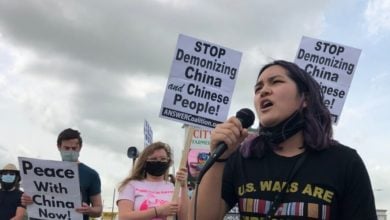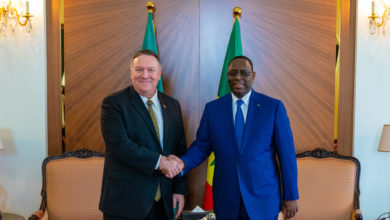
It is an outrage that Cuba, with hundreds of doctors and nurses in western Africa and tens of thousands worldwide, has to continue bearing the brunt of a cruel, genocidal U.S. blockade.
But Cuba’s international solidarity and medical marvels borne of its socialist convictions is exactly why the U.S. maintains the blockade.
Today the UN General Assembly—once again—voted overwhelmingly against the U.S. blockade of Cuba. Of the 193 member states, 188 countries stood with Cuba. Only two—the United States and Israel—voted for the 55-year policy that punishes Cuba for being free of U.S. rule.
It is exactly the same vote as last year’s non-binding referendum, and the 23rd year that the resolution, “Necessity of ending the economic, commercial and financial embargo imposed by the United States of America against Cuba,” has been before the UN.
The same three Pacific islands, Federated States of Micronesia, Palau and Marshall Islands, total population of 195,000, abstained this year, as they did last year. Since they are virtual U.S. colonies, their abstention is an important stance, too.
Citing $1.16 trillion dollars worth of damage to its economy and enormous harm to the Cuban people by the U.S.’s economic brutality, Cuba’s annual report to the General Assembly detailed the criminal effects of the blockade.
This year’s vote comes amidst the backdrop of an unprecedented three New York Times editorials, between Oct. 11 and 25, calling for an end to the blockade, normalizing of relations, and saluting Cuba’s medical contribution in the fight against Ebola.
Of course, the Times’ motivation is guided by its worry that the United States is becoming more isolated in Latin America. Reflecting the view of the liberal establishment, the editorial board believes engaging with Cuba is a more effective way to secure U.S. interests in Cuba and the entire region.
Continuing its admonishment, today The New York Times published another editorial, a blog entitled, “On Cuba Embargo, It’s the U.S. and Israel Against the World—Again.”
The world supports Cuba
In the General Assembly debates, many representatives denounced U.S. policy against Cuba, echoing the resounding demand of people around the world.
Of special note was Sacha Llorenti, Bolivia’s ambassador to the UN, who spoke in Bolivia’s capacity as current president tempore of the Group of 77 + China: “Human lives are threatened and public healthcare is undermined by the blockade, as well as education, culture, sports, finances, banking, foreign trade and foreign investment.”
He cited Nelson Mandela who once remarked, “They can never blockade the sovereignty, rebel spirit and infinite solidarity of the Cuban people.”
Bruno Rodríguez Parrilla, Cuba’s foreign minister, addressed the UN body, saying in part, “We invite the United States government to a mutually respectful relationship, on a reciprocal basis of sovereign equality, on the principles of International Law and the United Nations charter.
“We can try to find a solution to differences, by means of respectful dialogue and cooperation in aspects of common interest. We can live and relate to each other in a civilized way, within our differences.
“Cuba will never renounce its sovereignty nor the road freely chosen by its people to construct a more just and efficient, prosperous and sustainable socialism. Nor will we desist in the search for a different international order nor stop struggling for “world equilibrium.”
Will Obama change U.S. policy?
A number of political commentators in the United States are remarking that an easing of economic strictures could very well take place with Obama’s administration, suggesting the time would be after the Nov. 4 mid-term elections.
Yet, an analysis this week by Cuban economic experts shows that the Obama administration has actually aggressively enforced the illegal blockade. Since 2009, the government has levied billions of dollars in fines on international banks that conducted transactions with Cuba and other countries that the U.S. has demonized as “terrorist.”
In the Oct. 26 edition of Cuban newspaper Granma, Andrés Zaldívar Diéguez and Gretter Alfonso Guzmán explain,
“Whereas the government of George W. Bush concentrated on individuals who violated certain aspects of the blockade, the trend that has characterized the Obama administration has been the imposition of million-dollar fines against banks and financial institutions.
“Comparing the impact of both tendencies (Bush and Obama), there is no doubt that the latter has caused more damage to the economy and the Cuban people, given the intimidating effect that it exerts against commercial partners, foreign banks and other entities interested in maintaining relations with Cuba.”
(Read the Granma artículo en español)
Today’s vote is a great victory for the Cuban people, and an encouraging boost for the people of the world to continue to fight for the lifting of the blockade.
What is new with this year’s UN vote is the ever-increasing support for Cuba internationally and in the United States as well. Polls show the majority of the U.S. people, with higher numbers in Florida, support the end of the blockade and the right to travel to Cuba.
The objective of the U.S. economic, financial and commercial blockade, first expressed by president Eisenhower, “to bring about hunger, desperation and overthrow of government,” remains essentially the same.
But today it is the United States that is isolated with respect to Cuba. Cuba’s revolutionary government and socialism has enabled the Cuban people to withstand the blockade and develop a remarkable society of progress.
But Cuba should not have to endure one more day of hardship. Lift the blockade now!





